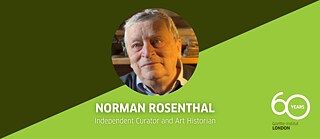Norman Rosenthal

First and foremost I have fondest memories of a very remarkable woman Dr Brigitte Lohmeyer, who was for many years, certainly during the nineteen sixties German Cultural Attaché at the then West German Embassy - not perhaps officially part of the Goethe-Institut, but obviously closely connected to it staying in London at her post for many more years - maybe even twenty - far more than is usually allowed to a diplomat as a representative of a foreign country. In those - for very good reason - difficult years when the horrors of Germany 1933 - 45 were still all too traumatically fresh in the mind, Brigitte became a true beacon of the best of German culture in London and the United Kingdom in general, enabling many extraordinary cultural events that had connections with West Germany - or even not if she saw that new enlightened ones could be built as a result.
In 1973 I was surprisingly and as a result of happenstance given the task of organising a “German Month" at the ICA that took place following a French Month then to celebrate - with small UK Government support - to celebrate(!) the UK’s entry into the EU. At that time two remarkable farsighted persons at the Goethe-Institut, Dr Klaus Schulz and his colleague Johannes Weißert who with of course the active encouragement of Dr Brigitte had already opened Gallery House then a vacant property adjacent to the North of the Institut. It had opened in 1972 under the “direction” of two now legendary figures in the fields of organising conceptual and performance art events then new and often very controversial “things” now being labelled under the rubric of “art”.
I particularly remember the artist Stuart Brisley, who had incarcerated himself in a locked room at the end of a corridor on the first floor for it seems seventeen days who could be observed through a peephole seemingly “drowning” in his own faeces. If not everything was quite that deliberately shocking significant artists like Robert Filliou, (French) Michael Drucks(Israeli) Carolee Schneemann (US) David Medalla (Indonesia) but also Gustav Metzger, Susan Hiller, and John Latham are just some of the artists who touched and were touched by the unique edgy atmosphere of Gallery House and its self declared internationalism. A book fully documenting its activities would indeed be worthwhile.
Meanwhile, I was with the support of “Goethe” now organising the German Month at the ICA about which many stories could be told. Above all with the German/Greek curator Christos M Joachimides an exhibition to be called Art into Society - Society into Art - Seven German Artists. They were Albrecht D, Joseph Beuys, KP Brehmer, Hans Haacke, Dieter Hacker, Gustav Metzger, Klaus Staeck.
For the exhibition, Joseph Beuys asked me to find him three school blackboard easels. I found him one hundred that I found in a school depot and out of he made the environment Richtkraefte (Directive Forces) that belongs now and is displayed at the Hamburger Bahnhof in Berlin. Klaus Staeck displayed his then-famous political posters on a “Litfaßsäule” in the Gallery. One of the posters showed the German Politician Franz-Josef Strauss as a butcher (Metzger) holding two knives and declaring “Entmannt Alle Wüßtlinge” (which roughly translates as ‘castrate all" libertines” possibly bastards). Nobody visiting the exhibition and not understanding German would have noticed this poster or its meaning. However, two German CDU members of the Bundestag came to see the exhibition and complained to the then-Munich Head of the Goethe-Institut. A huge huge fuss was to break out all over the German Press - documented in a fat book later published by Staeck. And at the opening of the exhibition, the Munich man (who ironically was in fact descended from Thomas Theodor Heine, the well-known German Satirist from before the World War!) just happened to whisper into my ear that 'You Mr Rosenthal will never receive subsidy again from Germany' …. ah well!